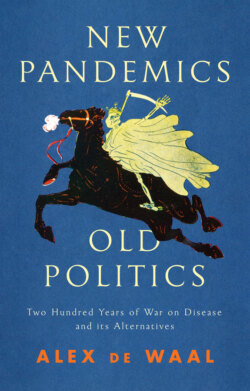New Pandemics, Old Politics

Реклама. ООО «ЛитРес», ИНН: 7719571260.
Оглавление
Alex de Waal. New Pandemics, Old Politics
CONTENTS
Guide
Pages
Dedication
NEW PANDEMICS, OLD POLITICS. Two Hundred Years of War on Disease and its Alternatives
Acknowledgements
1 Following the Science, Following the Script
Following the Science
A Week Is a Long Time
The ‘War on Disease’ Storyline
Towards Democratic, Ecological Public Health
Notes
2 The Rage of Numbers: Cholera
Cholera as Protagonist
Cholera on the March
Clausewitz and Cholera
Post-Mortem on Clausewitz
Cholera’s New Order
The Streets of London
Cholera’s Empire
Declaring War on Disease
The Train from Berlin
Notes
3 Metamorphosis: Influenza
The War before the War
The Jester
How It Began
‘Warriors’
A Story That Could Not Be Told
Track Changes
Notes
4 Who, Whom: HIV/AIDS
Cohabiting with HIV
HIV’s Thread
After Austerity, after Conflict, after Apartheid
Love and Liberation
AIDS in the Margins of Error
No Singular Story
Notes
5 Imagined Unknowns: Pandemic X
‘Outbreak’
Institutionalizing Uncertainty
Pandemic Preparedness Meets Bio-Terror
Viruses Are Things of Beauty
SARS: Storylines for Outbreak X
Influenza: How to Name a Pandemic?
The Usual Suspect, Ebola
Notes
6 Emancipatory Catastrophe? Covid-19
De-Prepared
Disruptive Capitalism and the Coronavirus
What Is It Like to Be a Bat (Virus)?
Alternatives to the ‘War on Disease’
Notes
References
Index. A
B
C
D
E
F
G
H
I
J
K
L
M
N
O
P
Q
R
S
T
U
V
W
X
Y
Z
POLITY END USER LICENSE AGREEMENT
Отрывок из книги
To my mother, Esther de Waal, who taught me how to think
Public leaders pay homage to ‘following the science’ but they actually follow a script. It’s a storyline with a reassuring ending. It goes something like this:
.....
We shouldn’t take the martial language too literally, and those who know it are well aware that it’s not a ‘real’ war. Scientists and public health experts see it as a way of validating their work, as an innocent cover story that appeals to a spirit of solidarity and selflessness and helps us cope with dangers and setbacks. Those are fair considerations, but the script has other consequences too. Policies are standardized and imposed by decree. The archetype is how the German imperial government defeated cholera in Hamburg, described at the end of chapter 2, and the American army’s conquest of yellow fever in Cuba, Panama, and the southern United States, described at the beginning of chapter 3. The way in which HIV and AIDS policies became part of an international security regime is examined in chapter 4, and in chapter 5 I will show some of the errors made by militarizing the response to Ebola. In America, the role of soldiers in ‘fighting’ diseases helps validate the apparently limitless expansion of the tasks given to the Pentagon – a definitional inflation that makes ‘war’ at once all-encompassing and meaningless.
Declaring war is also declaring a state of emergency, which is a temptation to autocrats. Labelling the microbe as an ‘invisible enemy’ or an ‘invader’ can imply that those who carry it are also enemies or invaders. In America, the term ‘lockdown’, innocuous in the white suburbs, has the resonance of the New Jim Crow among communities familiar with mass incarceration, where locking down prisoners in their cells is the routine response to a prison disturbance. Lockdowns may provide some immediate safety from physical injury to prisoners but their intent is to protect the prison itself. In countries familiar with civil war and counter-insurgency, the rhetoric and physical attributes of lockdown, such as checkpoints, curfews, and neighbourhood searches, are reminders that there is a thin line between policing a pathogen and policing a hostile population. The warlike language means that advocates for democracy, equity, and justice are constantly at a disadvantage, as their dissent may be seen as sabotaging the war effort.
.....